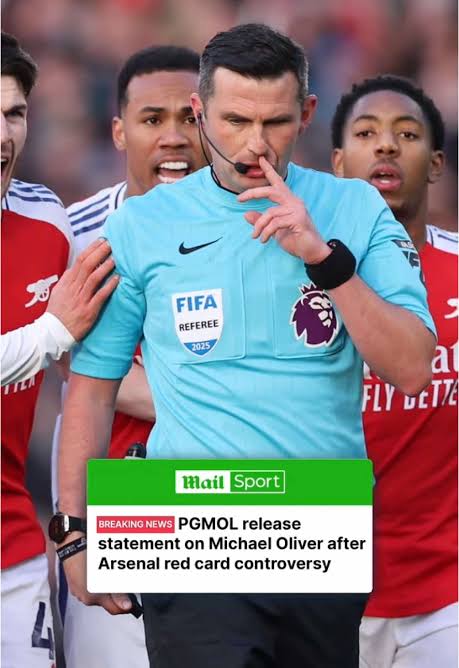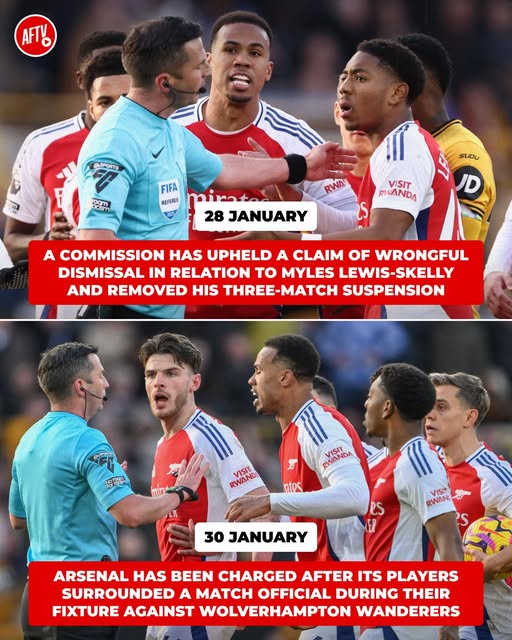‘I’m amazed’ – Premier League explain shocking Arsenal red card that made stadium gasp

Refereeing in England has become a topic of debate. The media does not discuss how refereeing styles vary across officials. Data shows clear differences in how referees handle games. Referees have patterns that can be predicted based on their past decisions. For example, Michael Oliver issues red cards at a much higher rate than other referees. This makes it possible to guess outcomes, such as card decisions, if you know who the referee is.
The media avoids discussing such patterns. Instead, they highlight incidents as isolated events. Recently, Arsenal experienced a questionable red card decision by Michael Oliver. The decision was heavily criticized by fans and experts. Match broadcasters and pundits called it a poor judgment. Even Alan Shearer described it as one of the worst decisions he had seen in a long time. The situation worsened when the VAR team also supported the referee’s call.
This red card happened during an Arsenal game when Myles Lewis-Skelly was sent off. The decision surprised many because it seemed unjustified. The foul had no speed, intensity, or danger, and it was far from the goal. Shearer questioned how VAR and the assistant referee reviewed the incident and still found the red card valid. Arsenal manager Mikel Arteta said the mistake was so obvious that no explanation was needed.
After this, the story shifted focus. Reports about referee abuse and threats dominated the headlines. Instead of investigating why the referee made a poor call, the media emphasized the actions of fans. The original issue of referee error was sidelined. The Professional Game Match Officials Limited (PGMO), the organization responsible for referees, escaped scrutiny.
This incident highlights a bigger problem with officiating in the Premier League. Referees make mistakes, but the system designed to correct them also fails. The VAR team, meant to prevent such errors, backed a clearly wrong decision. This raises questions about the accountability of referees and the PGMO.
Arsenal fans and some analysts believe the team has been unfairly targeted by referees. Statistics suggest certain referees favor specific outcomes, such as fewer wins for away teams. Arsenal has faced similar challenges before, including harsh yellow cards and inconsistent officiating. Allowing such errors to go unchallenged could embolden referees and the PGMO to continue making questionable calls.
Arteta and his team are now dealing with the fallout. The red card means Lewis-Skelly faces a three-game suspension. This comes at a time when Arsenal has crucial games ahead. The team must decide whether to appeal the decision. Appealing might not overturn the ban, but it could challenge the system and demand accountability.
Refereeing controversies are not new to the Premier League. Fans often feel frustrated when officials make poor decisions. However, what makes this case stand out is the VAR’s role. VAR was introduced to eliminate errors, yet it failed in this instance. The lack of transparency from the PGMO adds to the frustration. Referees rarely explain their decisions, and the organization remains secretive.
Mistakes happen, but the focus should be on learning from them. The PGMO must address why such errors occur and ensure they do not happen again. Ignoring these issues damages the credibility of referees and the league. Fans, players, and managers deserve better officiating and accountability.
The media also plays a role in shaping narratives. By focusing on referee abuse rather than errors, they shift attention away from the core problem. While abuse and threats are unacceptable, they should not overshadow the need for better officiating. The conversation must return to improving referee performance and holding them accountable.
This case has sparked widespread discussion among fans and analysts. Many believe the PGMO needs reform. Transparency, accountability, and better training could improve officiating standards. Without these changes, incidents like this will continue to frustrate teams and fans.
Arsenal’s experience serves as a reminder of the challenges teams face with refereeing inconsistencies. The team must focus on their performance while addressing these external challenges. Fans hope this incident leads to meaningful changes in how referees are managed and evaluated.















